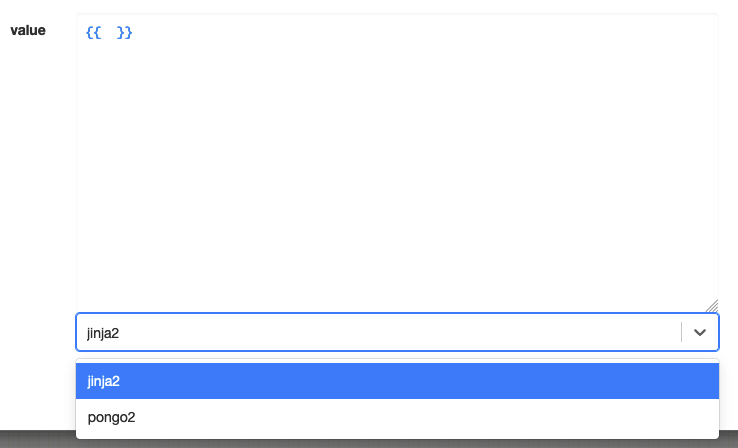Templates
Most fields in the nodes can be evaluated as templates. The default template engine is Jinja2 and expose all the buit-in's of the language.
To debug easily such fields, you can use the Template Playground reachable from the help section in the top bar.
It is extended with the following elements.
Filters
| Filter | Description | Sample |
|---|---|---|
| pp_dict | turn an object into a pretty-printed JSON string representation | {{ {'a': 1, 'b': 2} | pp_dict }} |
| dict_filter | filter a dictionary with a set of keys | {{ {'a': 1, 'b': 2, 'c': 3} | dict_filter(['a', 'b']) }} |
| json_query | inspect a JSON object with a JMESPath query | {{ {'a': 1, 'b': 2, 'c': 3} | json_query('a') }} |
| url_qs | parse a URL query string into a dictionary | {{ 'a=1&b=2&c=3' | url_qs }} |
| url_raw_query | parse a URL query string | {{ 'a=1&b=2&c=3' | url_raw_query }} |
| json | parse a JSON string into a dictionary | {{ '{"a": 1, "b": 2, "c": 3}' | json }} |
| url_path | extract the path from a URL | {{ 'http://apio.netaxis.cloud/api/v01/public/demo' | url_path }} |
| combine | merge dictionaries | {{ {'a': 1, 'b': 2} | combine({'c': 3}) }} |
| rest2dict | parse a REST call response into a dictionary (note: it automatically parse a body property as a JSON string into an object) | {{ rest2dict(rest) }} |
| regex_replace | use a regular expression to replace a string | {{ 'hello, world' | regex_replace('hello', 'goodbye') }} |
| regex_findall | use a regular expression to find all matches in a string | {{ 'hello, world' | regex_findall('l') }} |
| regex_search | use a regular expression to search a string | {{ 'hello, world' | regex_search('l') }} |
| unique | exclude duplicates from a list | {{ [1, 2, 3, 1, 2, 3] | unique }} |
| intersect | intersect two lists | {{ [1, 2, 3] | intersect([2, 3, 4]) }} |
| difference | difference between two lists | {{ [1, 2, 3] | difference([2, 3, 4]) }} |
| union | union of two lists | {{ [1, 2, 3] | union([2, 3, 4]) }} |
| min | minimum value of a list | {{ [1, 2, 3] | min }} |
| max | maximum value of a list | {{ [1, 2, 3] | max }} |
| b64encode | base64 encode a string | {{ 'hello, world' | b64encode }} |
| b64decode | base64 decode a string | {{ 'aGVsbG8sIHdvcmxk' | b64decode }} |
| phonenumber_valid | check if a phone number is valid | {{ '+33612345678' | phonenumber_valid }} |
| phonenumber_e164 | convert a phone number to E164 format | {{ '+33612345678' | phonenumber_e164 }} |
| phonenumber_cc | extract the country code from a phone number | {{ '+33612345678' | phonenumber_cc }} |
| phonenumber_cca | extract the country code from a phone number in alpha-2 format | {{ '+33612345678' | phonenumber_cca }} |
| phonenumber_type | extract the type of a phone number | {{ '+33612345678' | phonenumber_type }} |
| strftime | format a date | {{ '2021-01-01' | strftime('%Y-%m-%d') }} |
| to_datetime | convert a string to a datetime object | {{ '2021-01-01' | to_datetime }} |
| to_bool | convert a string to a boolean (evaluate to true: "yes", "on", "1", "true", 1) | {{ 'true' | to_bool }} |
| hmac | generate hash for a string, using a key (optional); supported digests: sha1, sha224, sha256 (default), sha384, sha512, blake2b, blake2s | {{ 'secret' | hmac }} {{ 'secret' | hmac('key') }} {{ 'secret' | hmac('key', 'sha512') }} |
| chunked | split a list into chunks | {{ [1, 2, 3, 4, 5, 6] | chunked(2) | list }} |
Tests
| Test | Description | Sample |
|---|---|---|
| startswith | check if a string starts with a substring | {{ 'hello, world' | startswith('hello') }} |
| endswith | check if a string ends with a substring | {{ 'hello, world' | endswith('world') }} |
Functions
| Function | Description | Sample |
|---|---|---|
| now | compute the current date and time | {{ now() }} |
| tz | apply a timezone to a date | {{ now(tz('Europe/Paris')) }} |
| timedelta | apply a delta to a date | {{ now() | timedelta(days=1) }} |
| utcnow | compute the current date and time in UTC | {{ utcnow() }} |
| uuid | generate a UUID | {{ uuid() }} |
| randint | generate a random integer | {{ randint(1, 10) }} |
Variables
| Variable | Description |
|---|---|
| request | the current request object. Use {{ (request.body | rest2dict).<property> }} to access request body triggered by an HTTP custom endpoint |
| instance | the current instance object running a workflow with the following attributes: id, guid, callback_task_id, user_id, original_request_id, label |
| context | a key-value map attached to the current workflow instance |
| tasks | tasks ran until there with their status |
| sub_instances_responses | "callback" responses produced by sub-instances |
| parent_instance_context | context of the parent instance (only filled in sub-instance) |
| settings | a dictionary containing the settings of the platform (sensitive content are removed for security reason) |
| env | a dictionary containing the environment variables of the platform |
| proxy_name | the name of the proxy (only filled in processes started with proxy binding) |
| worker_env | a dictionary containing the environment variables of the worker process (note: it allows to attach different values depending on the running location) |
| user | the user object of the current user (only filled when the instance has an owner defined) |
Alternatives
While jinja2 is the default template engine, you can use other engines by specifying the engine attribute in the field (just under the template in the editor).

TIP
Jinja2 is a Python based template engine, so it is the most extensible and powerful engine available. But because it is Python based, it is not the fastest engine available. If you have a lot of templates to evaluate, or templates with big data or slow templates, you may want to consider using a faster and lighter engine like Pongo2.
Pongo2
Documentation: https://github.com/flosch/pongo2
